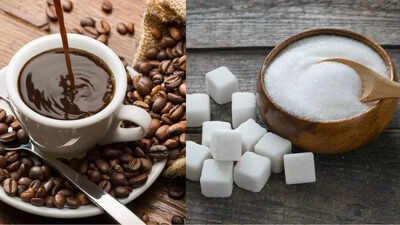US cardiologist warns: Coffee and sugar may accelerate ageing and harm heart health; limit intake recommended |

US-based functional cardiologist Dr. Sanjay Bhojraj has issued a warning for coffee and sugar enthusiasts, highlighting that common indulgences may silently accelerate biological ageing. In a recent Instagram post, he explained that excessive reliance on caffeine and sugar doesn’t only lead to temporary energy spikes and crashes—it triggers persistent stress and inflammation throughout the body. These internal responses can strain the cardiovascular system, elevate cortisol levels, disrupt sleep, and impair natural recovery processes. Over time, this combination increases the risk of heart disease and contributes to accelerated ageing, even in apparently healthy individuals. Dr. Bhojraj emphasises that cravings signal the body is fueled incorrectly, underscoring the importance of mindful consumption for long-term heart health and vitality.
Hidden link between sugar, inflammation, and accelerated ageing
When you consume sugary foods or drinks, your blood sugar levels rise sharply. These spikes lead to the formation of Advanced Glycation End Products (AGEs), harmful compounds created when sugar molecules attach to proteins or fats. Studies published in Circulation (AHA) show that AGEs trigger oxidative stress and arterial damage, eventually contributing to atherosclerosis and heart disease.Repeated blood sugar fluctuations create chronic low-grade inflammation, which silently scars arteries and weakens blood vessels. Even without visible symptoms, this damage sets the stage for cardiovascular disease over years.
How caffeine keeps the body in “stress mode”
While caffeine offers a temporary energy lift, regular overconsumption can keep the nervous system in a constant fight-or-flight state. Research from the Mayo Clinic notes that caffeine temporarily raises blood pressure and cortisol, the body’s main stress hormone. Elevated cortisol interferes with recovery, sleep, and normal metabolic balance.This creates a cycle where people rely on more caffeine to combat fatigue, only to worsen the problem. Over time, this disrupted rhythm of stress and recovery contributes to accelerated biological ageing, even in people who otherwise seem outwardly healthy.
Cravings as a signal, not a weakness
Dr. Bhojraj emphasises that cravings for coffee and sugar shouldn’t be dismissed as personal weakness. Instead, they are warning signals from the body, showing that it is running on unstable fuel sources. Repeated reliance on stimulants trains the body to depend on external boosts, leaving natural energy reserves depleted.Recognizing these signals early may help prevent deeper health complications linked to poor nutrition and chronic stress responses.
Coffee’s benefits: How additives can cancel them out
Not all coffee is harmful. In fact, multiple studies—including a 2017 umbrella review published in BMJ—show that moderate coffee consumption (about 3–5 cups daily) is linked with a lower risk of type 2 diabetes, certain cancers, cardiovascular disease, and cognitive decline.However, these protective effects are undermined when coffee is loaded with sugar, flavored syrups, or heavy cream. Dr. Sudhir Kumar, senior neurologist and CMC Vellore graduate, points out that sugary lattes and dessert-like coffee drinks essentially act like liquid sugar bombs. Harvard Health echoes this, noting that coffee with added sugar does not provide additional benefits and may instead increase calorie intake and metabolic risks.
Safe intake levels: How much is too much
Health organizations provide clear guidelines to minimize risks. According to the US Food and Drug Administration (FDA), up to 400 milligrams of caffeine per day—roughly 3 to 4 cups of brewed coffee—is considered safe for most adults. The World Health Organization (WHO) recommends keeping free sugar intake below 10% of total daily energy, ideally closer to 5% for maximum health benefits.These benchmarks highlight that moderation, rather than elimination, is the key to enjoying coffee while reducing the harmful impact of added sugar.
Choosing the right fuel for longevity
Your daily cup of coffee or sweet snack may feel harmless, but over time it could contribute to stress, inflammation, poor sleep, and accelerated ageing. Dr. Bhojraj’s advice is clear: the fuel you choose shapes your long-term health. Opting for black coffee, reducing added sugars, and keeping caffeine intake within healthy limits can preserve coffee’s benefits while protecting your heart and slowing down the ageing process.Choosing wisely today could mean better heart health, improved sleep quality, more stable energy, and ultimately, a healthier and longer life.Also Read | Lose stubborn belly fat at home without extreme diets or intense workouts: Gastro-specialist reveals 3 simple tips
var _mfq = window._mfq || [];
_mfq.push([“setVariable”, “toi_titan”, window.location.href]);
!(function(f, b, e, v, n, t, s) {
function loadFBEvents(isFBCampaignActive) {
if (!isFBCampaignActive) {
return;
}
(function(f, b, e, v, n, t, s) {
if (f.fbq) return;
n = f.fbq = function() {
n.callMethod ? n.callMethod(…arguments) : n.queue.push(arguments);
};
if (!f._fbq) f._fbq = n;
n.push = n;
n.loaded = !0;
n.version = ‘2.0’;
n.queue = [];
t = b.createElement(e);
t.async = !0;
t.defer = !0;
t.src = v;
s = b.getElementsByTagName(e)[0];
s.parentNode.insertBefore(t, s);
})(f, b, e, ‘https://connect.facebook.net/en_US/fbevents.js’, n, t, s);
fbq(‘init’, ‘593671331875494’);
fbq(‘track’, ‘PageView’);
};
function loadGtagEvents(isGoogleCampaignActive) {
if (!isGoogleCampaignActive) {
return;
}
var id = document.getElementById(‘toi-plus-google-campaign’);
if (id) {
return;
}
(function(f, b, e, v, n, t, s) {
t = b.createElement(e);
t.async = !0;
t.defer = !0;
t.src = v;
t.id = ‘toi-plus-google-campaign’;
s = b.getElementsByTagName(e)[0];
s.parentNode.insertBefore(t, s);
})(f, b, e, ‘https://www.googletagmanager.com/gtag/js?id=AW-877820074’, n, t, s);
};
function loadSurvicateJs(allowedSurvicateSections = []){
const section = window.location.pathname.split(‘/’)[1]
const isHomePageAllowed = window.location.pathname === ‘/’ && allowedSurvicateSections.includes(‘homepage’)
const ifAllowedOnAllPages = allowedSurvicateSections && allowedSurvicateSections.includes(‘all’);
if(allowedSurvicateSections.includes(section) || isHomePageAllowed || ifAllowedOnAllPages){
(function(w) {
function setAttributes() {
var prime_user_status = window.isPrime ? ‘paid’ : ‘free’ ;
var geoLocation = window?.geoinfo?.CountryCode ? window?.geoinfo?.CountryCode : ‘IN’ ;
w._sva.setVisitorTraits({
toi_user_subscription_status : prime_user_status,
toi_user_geolocation : geoLocation
});
}
if (w._sva && w._sva.setVisitorTraits) {
setAttributes();
} else {
w.addEventListener(“SurvicateReady”, setAttributes);
}
var s = document.createElement(‘script’);
s.src=”https://survey.survicate.com/workspaces/0be6ae9845d14a7c8ff08a7a00bd9b21/web_surveys.js”;
s.async = true;
var e = document.getElementsByTagName(‘script’)[0];
e.parentNode.insertBefore(s, e);
})(window);
}
}
window.TimesApps = window.TimesApps || {};
var TimesApps = window.TimesApps;
TimesApps.toiPlusEvents = function(config) {
var isConfigAvailable = “toiplus_site_settings” in f && “isFBCampaignActive” in f.toiplus_site_settings && “isGoogleCampaignActive” in f.toiplus_site_settings;
var isPrimeUser = window.isPrime;
var isPrimeUserLayout = window.isPrimeUserLayout;
if (isConfigAvailable && !isPrimeUser) {
loadGtagEvents(f.toiplus_site_settings.isGoogleCampaignActive);
loadFBEvents(f.toiplus_site_settings.isFBCampaignActive);
loadSurvicateJs(f.toiplus_site_settings.allowedSurvicateSections);
} else {
var JarvisUrl=”https://jarvis.indiatimes.com/v1/feeds/toi_plus/site_settings/643526e21443833f0c454615?db_env=published”;
window.getFromClient(JarvisUrl, function(config){
if (config) {
const allowedSectionSuricate = (isPrimeUserLayout) ? config?.allowedSurvicatePrimeSections : config?.allowedSurvicateSections
loadGtagEvents(config?.isGoogleCampaignActive);
loadFBEvents(config?.isFBCampaignActive);
loadSurvicateJs(allowedSectionSuricate);
}
})
}
};
})(
window,
document,
‘script’,
);
Source link




